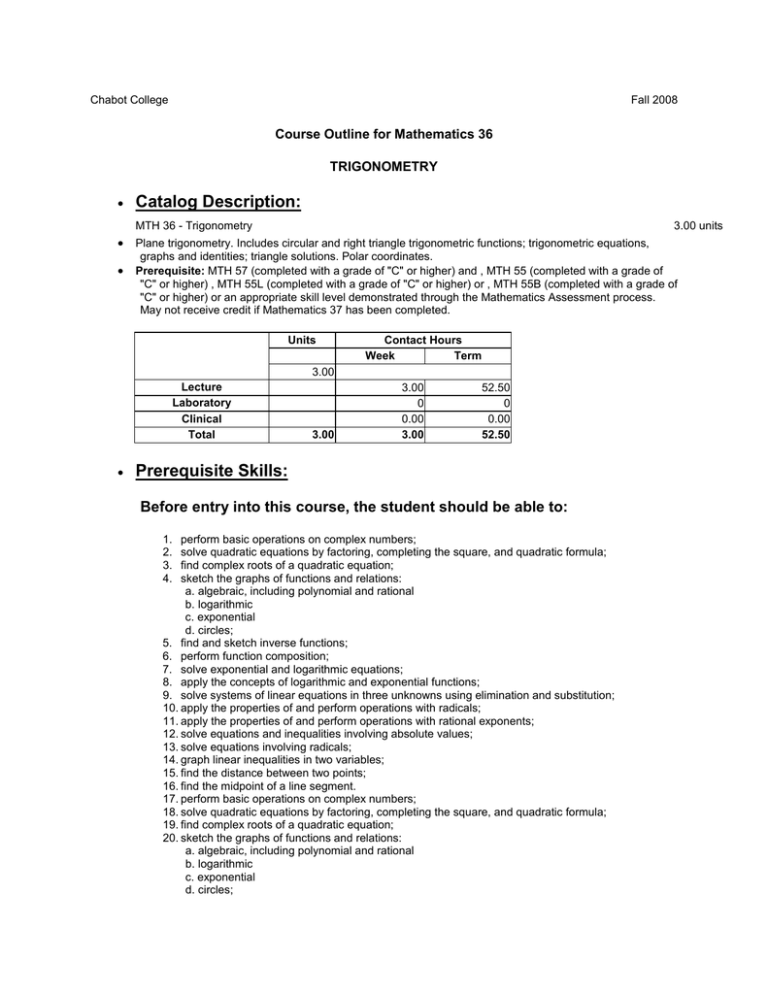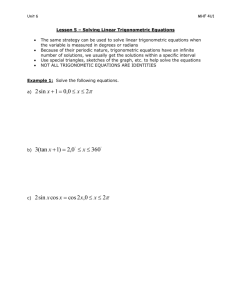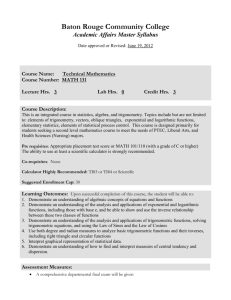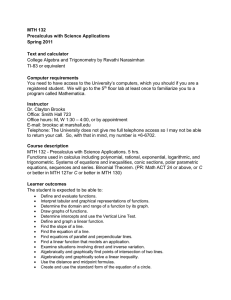Catalog Description: Course Outline for Mathematics 36 TRIGONOMETRY •
advertisement

Chabot College Fall 2008 Course Outline for Mathematics 36 TRIGONOMETRY • Catalog Description: MTH 36 - Trigonometry 3.00 units • Plane trigonometry. Includes circular and right triangle trigonometric functions; trigonometric equations, graphs and identities; triangle solutions. Polar coordinates. • Prerequisite: MTH 57 (completed with a grade of "C" or higher) and , MTH 55 (completed with a grade of "C" or higher) , MTH 55L (completed with a grade of "C" or higher) or , MTH 55B (completed with a grade of "C" or higher) or an appropriate skill level demonstrated through the Mathematics Assessment process. May not receive credit if Mathematics 37 has been completed. Units Contact Hours Week Term 3.00 Lecture Laboratory Clinical Total • 3.00 3.00 0 0.00 3.00 52.50 0 0.00 52.50 Prerequisite Skills: Before entry into this course, the student should be able to: 1. 2. 3. 4. perform basic operations on complex numbers; solve quadratic equations by factoring, completing the square, and quadratic formula; find complex roots of a quadratic equation; sketch the graphs of functions and relations: a. algebraic, including polynomial and rational b. logarithmic c. exponential d. circles; 5. find and sketch inverse functions; 6. perform function composition; 7. solve exponential and logarithmic equations; 8. apply the concepts of logarithmic and exponential functions; 9. solve systems of linear equations in three unknowns using elimination and substitution; 10. apply the properties of and perform operations with radicals; 11. apply the properties of and perform operations with rational exponents; 12. solve equations and inequalities involving absolute values; 13. solve equations involving radicals; 14. graph linear inequalities in two variables; 15. find the distance between two points; 16. find the midpoint of a line segment. 17. perform basic operations on complex numbers; 18. solve quadratic equations by factoring, completing the square, and quadratic formula; 19. find complex roots of a quadratic equation; 20. sketch the graphs of functions and relations: a. algebraic, including polynomial and rational b. logarithmic c. exponential d. circles; 21. find and sketch inverse functions; 22. perform function composition; 23. solve exponential and logarithmic equations; 24. apply the concepts of logarithmic and exponential functions; 25. solve systems of linear equations in three unknowns using elimination and substitution; 26. apply the properties of and perform operations with radicals; 27. apply the properties of and perform operations with rational exponents; 28. solve equations and inequalities involving absolute values; 29. solve equations involving radicals; 30. graph linear inequalities in two variables; 31. find the distance between two points; 32. find the midpoint of a line segment. 33. define and/or illustrate: a. segment b. ray c. angle d. distance between points on a line e. perpendicular and parallel lines f. midpoint of a segment; 34. demonstrate: a. the elements of a formal proof b. the ability to utilize (1) above in the solution of problem material c. geometric inequalities d. the relation of arcs and angles formed by chords, secants and tangents to circles through proofs and problems e. the relation of circles and regular polygons, both inscribing and circumscribing; 35. form a conclusion based on mathematical logic; 36. compute areas and volumes of geometric figures; 37. do constructions with straight edge and compass. • Expected Outcomes for Students: Upon completion of this course, the student should be able to: 1. 2. 3. 4. identify and use the trigonometric ratios in problem solving; use radian measure; define trigonometric functions in terms of the right triangle and the unit circle; write down from memory the values of sine, cosine, and tangent functions of standard angles, both in degree and radian measure; 5. write down from memory the Pythagorean identities, reciprocal identities, double angle formulas for sine and cosine, and sum and difference formulas for the sine and cosine; 6. prove trigonometric identities; 7. use trigonometric formulas; 8. solve trigonometric equations with multiple angles over different intervals; 9. use the law of sines and the law of cosines to solve oblique triangles; 10. graph trigonometric functions; 11. graph the inverse sine, inverse cosine, and inverse tangent functions; 12. convert between polar coordinate system and rectangular coordinate system; 13. graph polar equations. • Course Content: 1. 2. 3. 4. 5. 6. • Trigonometric functions Trigonometric equations Trigonometric formulas and identities The graphs of trigonometric functions and their inverses Polar coordinates Solution of triangles and related problems Methods of Presentation 1. Lecture/Discussion 2. Group discussions 3. Problem sessions • Assignments and Methods of Evaluating Student Progress 1. Typical Assignments A. Exercises from the text book Read section 3.1 Do exercises 1 – 13 odd, 15 – 20 all, and 27 B. Collaboratives Give the students unit circles on a rectangular grid system. Have the students draw the graphs of y = sin x, y = cos x and y = tan x. 2. Methods of Evaluating Student Progress A. B. C. D. • Exams/Tests Quizzes Home Work Final Examination Textbook (Typical): 1. Barnett/Ziegler/Byleen (2006). Analytic Trigonometry with Applications Brooks/Cole Publishing Co. • Special Student Materials 1. Scientific calculator





